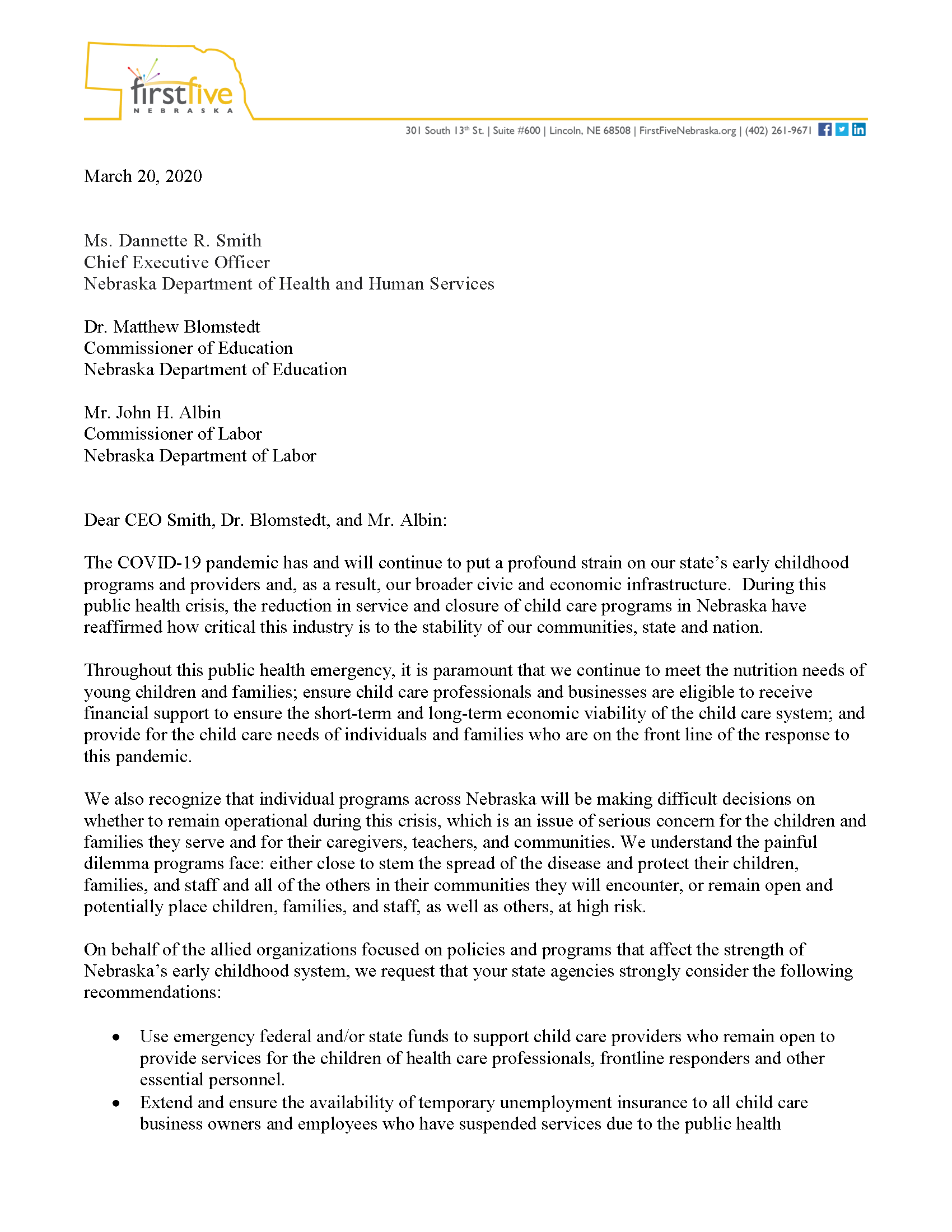As the national COVID-19 crisis continues to develop, First Five Nebraska and a group of affiliated early childhood organizations have issued a letter asking state officials to consider policy action to mitigate the effects of the emergency on Nebraska’s early childhood system. The proposals address the health, safety and financial security of young children and working parents as well as child care professionals and businesses. The letter was sent to the CEO of the Nebraska Department of Health and Human Services, the directors of the Nebraska Departments of Education and Labor, and the members of the State Legislature.
 The letter represents the views of First Five Nebraska, as well as those of the Buffett Early Childhood Fund, Nebraska Children and Families Foundation, Buffett Early Childhood Institute and the Nebraska Early Childhood Collaborative.
The letter represents the views of First Five Nebraska, as well as those of the Buffett Early Childhood Fund, Nebraska Children and Families Foundation, Buffett Early Childhood Institute and the Nebraska Early Childhood Collaborative.
READ THE FULL TEXT OF THE LETTER HERE
“Our state’s ability to weather and recover from the current public health emergency is contingent upon our ability to field skilled personnel in health care, public safety and other frontline roles,” said Jason Prokop, director of First Five Nebraska. “Reductions or closures in child care and other early childhood services mean that working parents in infrastructure-critical jobs face even greater challenges to fulfill their professional responsibilities. Now is the time to take decisive action to support the short- and long-term viability of our early childhood system.”
The letter’s policy recommendations include the following:
- Use emergency federal and/or state funds to support child care providers who remain open to provide services for the children of health care professionals, frontline responders and other essential personnel.
- Extend and ensure the availability of temporary unemployment insurance to all child care business owners and employees who have suspended services due to the public health emergency, as well as working parents. In addition, consider making paid sick and family leave supports available to the child care workforce and working parents.
- Temporarily suspend redetermination of family eligibility for support services such as WIC, SNAP, Medicaid, TANF and child care subsidy to ensure continuity of benefits during the public health emergency.
- Utilize the TANF rainy day fund to pay for any unexpected child care costs.
- Maximize federal flexibility in the Child and Adult Care Food Program (CACFP) to provide critical resources (food, formula, etc.) through delivery rather than community site distribution.
- For those providers remaining open to support health care workers and emergency responders, adopt temporary flexibility in federal and state operations related to regulation of the child care industry, while ensuring the safety, health and well-being of children in care.
- Increase access to and flexibility of loan, grant and financial incentive/support programs to help child care businesses resume service when the public health environment has stabilized.
- Introduce policies to base child care reimbursement payments on enrollment levels rather than current attendance to help stabilize funding and ensure child care programs remain financially viable.
- Allow providers to waive co-pays for families dealing with income interruptions and fluctuations.
- To the extent practical, explore opportunities to temporarily use teachers and educational professionals who meet background check requirements to supplement the early childhood system.
- Ensure health and mental health resources are available to child care and early learning providers, as well as to children and their families, and are paid by federal funds to the greatest extent possible.
- Designate funding for community access to trauma-based services.
“These recommendations address critical family nutrition needs, protect the financial stability of early childhood professionals and businesses, and continue to provide child care for essential personnel who are leading the response during the COVID-19 emergency,” said Prokop. “We look forward to working directly with state leaders to put Nebraska on a better footing to respond to and recover from the current crisis.”



